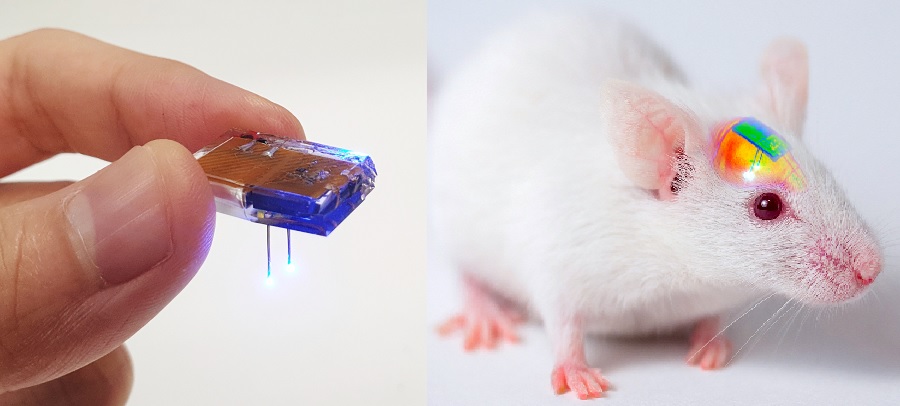A group of KAIST researchers and collaborators have engineered a tiny brain implant that can be wirelessly recharged from outside the body to control brain circuits for long periods of time without battery replacement.
The device is constructed of ultra-soft and bio-compliant polymers to help provide long-term compatibility with tissue. Geared with micrometer-sized LEDs (equivalent to the size of a grain of salt) mounted on ultrathin probes (the thickness of a human hair), it can wirelessly manipulate target neurons in the deep brain using light.
According to the study, which was published in the journal Nature Communications and announced by the Foundation in an official statement on January 26, this type of chip was facing a fundamental problem related to energy, as these chips must be removed from the brains of mice through operations, then shipped and returned with another surgical procedure.
Control circuit
To reach these results, the team manufactured this tiny brain implant from ultra-fine polymers that are compatible with the tissues in the mouse’s body for long periods of time, as well as equipped with light bulbs, with micrometer sizes, installed in turn on super-thin sensors, the thickness of a human hair.
The aim of these chips is to control the circuits of the brain, by wirelessly controlling specific nerve cells. It is known that the excitation of the nerve cells occurs through the currents of electrical charges that flow in the brain in a natural way. And in the case of that chip, the light plays this role, enabling it to control certain areas within the brain.
To enable wireless charging of the battery for that chip, the researchers developed a small circuit that integrates a wireless power harvester with an antenna and a low-energy “Bluetooth” chip, so that the magnetic field leaving it can penetrate the tissue safely.
The Bluetooth chip integrated in this circuit gives easier control of neurons via smartphones carried by researchers, in which researchers program light pulses to perform specific functions.
According to the study, the research team has successfully tested these tiny brain implant in mice, showing their ability to suppress the behavior resulting from cocaine injection, and during these processes it was possible to recharge the battery in the chip repeatedly at a time when the mice were behaving freely.
“The fact that we can control a specific behaviour of animals, by delivering light stimulation into the brain just with a simple manipulation of smartphone app, watching freely moving animals nearby, is very interesting and stimulates a lot of imagination,” said Jeong-Hoon Kim, a professor of physiology at Yonsei University’s College of Medicine. “This technology will facilitate various avenues of brain research.”
The researchers believe this brain implant technology may lead to new opportunities for brain research and therapeutic intervention to treat diseases in the brain and other organs.
Sources:
- The study source: https://news.kaist.ac.kr/newsen/html/news/?mode=V&mng_no=12111
- official report: https://www.nature.com/articles/s413-y

